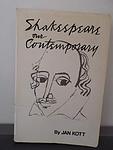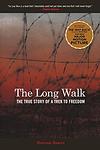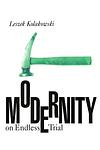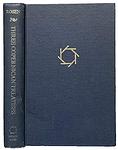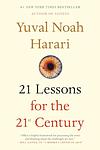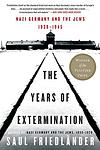The Greatest Polish, Israeli "Nonfiction" Books of All Time
Click to learn how this list is calculated.
This list represents a comprehensive and trusted collection of the greatest books. Developed through a specialized algorithm, it brings together 300 'best of' book lists to form a definitive guide to the world's most acclaimed books. For those interested in how these books are chosen, additional details can be found on the rankings page.
Genres
Countries
Date Range
Reading Statistics
Click the button below to see how many of these books you've read!
Download
If you're interested in downloading this list as a CSV file for use in a spreadsheet application, you can easily do so by clicking the button below. Please note that to ensure a manageable file size and faster download, the CSV will include details for only the first 500 books.
Download-
1. On the Revolutions of the Heavenly Spheres by Nicolaus Copernicus
This book presents the revolutionary astronomical model that places the sun, rather than the earth, at the center of the universe. The author challenges the geocentric model of the cosmos, which had been widely accepted since the time of Aristotle, and instead proposes a heliocentric system, where the planets orbit the sun. This revolutionary idea transformed the way we understand our place in the universe, paving the way for modern astronomy and science.
-
2. The Captive Mind by Czesław Miłosz
"The Captive Mind" is a thought-provoking exploration of the intellectual and moral dilemmas faced by artists and intellectuals living under oppressive regimes. Through a series of powerful and insightful essays, the author delves into the psychological and ideological transformations experienced by individuals who compromise their values and conform to the demands of totalitarianism. With a blend of personal anecdotes, historical analysis, and philosophical reflections, this book offers a profound examination of the complexities of intellectual freedom and the power of ideology.
-
3. Shah Of Shahs by Ryszard Kapuscinski
This book is a compelling blend of history and personal narratives, set against the backdrop of Iran's 1979 revolution. The author, a seasoned journalist, delves into the complex tapestry of Iranian society, exploring the rise and fall of the last monarch. Through a series of vignettes and interviews with Iranians from all walks of life, the narrative captures the atmosphere of fear and hope that defined the era. The work is as much an examination of the mechanics of power and the ease with which a society can be manipulated as it is a chronicle of a pivotal moment in Iran's history. The author's lyrical prose and sharp insights offer a timeless reflection on the nature of tyranny and the human struggle for freedom.
-
4. Sapiens: A Brief History of Humankind by Yuval Noah Harari
This book provides a comprehensive exploration of the history of the human species, tracing back from the earliest forms of Homo Sapiens to the modern day. It delves into evolutionary biology, the development of cultures and societies, and the rise of major ideologies and technologies. The book also discusses the future of the species, posing thought-provoking questions about our roles and responsibilities in a rapidly changing world.
-
5. Thinking, Fast and Slow by Daniel Kahneman
The book delves into the two systems that drive the way we think—System 1, which is fast and intuitive, and System 2, which is slow and deliberate. The author, a Nobel laureate, explores how these systems shape our judgments and decision-making. He presents several groundbreaking experiments that have shaped our understanding of human thought, revealing where we can trust our intuitions and how we can tap into the benefits of slow thinking. The book also discusses how our cognitive biases often lead to errors in judgment and affect our decision-making processes.
-
6. Alchemy Of The Word by Jan Parandowski
This book is a profound exploration of the transformative power of language and literature. Through a series of essays, the author delves into the essence of storytelling, the nuances of translation, and the enduring impact of classical texts on modern writing. By examining the works of various literary giants and the myths that have shaped human culture, the narrative underscores the alchemical process through which words can transcend time, evoke emotions, and alter perceptions. It is a tribute to the written word's ability to enchant, educate, and inspire, serving as a testament to literature's role in the continuous shaping of human civilization.
-
7. Main Currents Of Marxism by Leszek Kolakowski
This comprehensive work is a critical analysis of the development and influence of Marxist thought throughout history. It delves into the origins of Marxist theory, tracing its evolution from the philosophical foundations laid by Karl Marx and Friedrich Engels, through various interpretations and schools of thought, including Leninism, Stalinism, and Trotskyism, up to its impact on political movements and intellectual debates in the 20th century. The author scrutinizes the theoretical underpinnings and practical applications of Marxism, exploring both its contributions to social science and its shortcomings, ultimately providing a thorough examination of its role in shaping modern political and economic landscapes.
-
8. The Emperor by Ryszard Kapuscinski
"The Emperor" is a non-fiction account of the final years of Haile Selassie's reign as the Emperor of Ethiopia. It is based on interviews with his former courtiers and officials, providing a unique and intimate portrayal of a regime marked by lavishness, intrigue, and corruption. This work also explores the dramatic events leading up to the Emperor's downfall and the Ethiopian revolution.
-
9. The Literary Work Of Art by Roman Ingarden
"The Literary Work of Art" is a philosophical exploration into the ontology of literature, examining how a literary work exists as a multilayered structure, comprising of sounds, meanings, and the phenomenological experiences they evoke. The book delves into the intricacies of how these layers interact to create a dynamic and immersive aesthetic object, which is both a creation of the author and an interpretation by the reader. Through a detailed analysis, the work discusses the role of ambiguity, intentionality, and the reader's involvement in actualizing a text, offering a comprehensive framework for understanding the complexity and richness of literary art.
-
10. 89 Poems by Zbigniew Herbert
"89 Poems" is a collection of profound and thought-provoking poems that explore various themes such as history, art, nature, and the human condition. Through his exquisite use of language and vivid imagery, the author invites readers on a journey of introspection and contemplation, delving into the complexities of existence and the timeless questions that define our humanity. With each poem, "89 Poems" offers a unique perspective on life, leaving readers with a renewed appreciation for the power of poetry to illuminate the world around us.
-
11. A World Apart by Gustaw Herling-Grudziński
"A World Apart" is a powerful memoir that recounts the author's experiences as a political prisoner in a Soviet labor camp during World War II. Through vivid and harrowing descriptions, the book exposes the brutality and inhumanity of the camp system, as well as the resilience and strength of the prisoners. It serves as a haunting reminder of the atrocities committed during this dark period of history and the enduring human spirit.
-
12. Alicia by Alicia Appleman-Jurman
The book is a harrowing memoir of a young Jewish girl's survival during the Holocaust. It recounts her life from a peaceful childhood in a small Polish town to the unspeakable horrors of Nazi occupation. As her family is decimated and her world is torn apart, she becomes a courageous messenger for the Jewish resistance, risking her life to help others while on a relentless quest for survival. Her story is one of remarkable resilience, hope, and the enduring strength of the human spirit in the face of unimaginable adversity.
-
13. Homo Deus by Yuval Noah Harari
This book explores the future of humankind, building upon the foundation laid by its exploration of our past. It delves into the potential paths humanity might take as technological advancements and artificial intelligence begin to challenge the very essence of what it means to be human. The narrative posits that as we conquer famine, war, and plague, our focus shifts towards achieving happiness, immortality, and divinity, raising profound questions about our future roles and values in a world where machines and algorithms might outperform us in thinking, making decisions, and understanding the universe. Through a blend of philosophy, history, and future-gazing, the book invites readers to consider the implications of such a future, both exhilarating and daunting.
-
14. Imperium by Ryszard Kapuscinski
"Imperium" is a gripping account of the author's travels through the Soviet Union during the final years of its existence. With a keen eye for detail and a deep understanding of the complexities of power, the author delves into the lives of ordinary people and high-ranking officials alike, revealing the oppressive nature of the Soviet regime and the profound impact it had on the lives of its citizens. Through vivid descriptions and insightful observations, the book offers a compelling narrative that sheds light on the inner workings of a crumbling empire.
-
15. Shakespeare Our Contemporary by Jan Kott
"Shakespeare Our Contemporary" is a critical analysis that explores the relevance of Shakespeare's plays to modern society. The book argues that Shakespeare's themes are timeless and universal, delving into the ways his works address fundamental human issues and conflicts that resonate even in the contemporary world. Through a series of essays, the author examines various plays by Shakespeare, reinterpreting them through modern philosophical and psychological lenses, and demonstrating how they reflect the political and social realities of the twentieth century. The book has been influential in shaping modern interpretations of Shakespeare, particularly in the realm of theater, influencing directors and actors to approach the plays with new perspectives.
-
16. My Life by Golda Meir
The book is an autobiography of one of the most influential women in modern history, who rose from the poverty of her childhood in Russia and Milwaukee to become the Prime Minister of Israel. It offers a compelling account of her role in the founding of the state of Israel and its early years, providing personal insights into the myriad political and military challenges the nascent country faced. The narrative is interwoven with her own life story, including her experiences with immigration, education, and her rise through the ranks of the labor movement and political leadership, all set against the backdrop of the 20th century's tumultuous events leading up to and following the establishment of Israel.
-
17. The Long Walk by Slavomir Rawicz
"The Long Walk" is a harrowing narrative of a group of prisoners who escape from a Siberian gulag during World War II, and undertake a treacherous journey through the harsh Siberian wilderness, the Gobi desert, the Himalayas, and finally to India. The story is based on the author's own experiences and portrays the indomitable human spirit, survival against all odds, camaraderie, and the will to freedom.
-
18. Modernity On Endless Trial by Leszek Kolakowski
"Modernity on Endless Trial" is a collection of essays that delve into the philosophical and cultural critiques of modernity, exploring the tensions and challenges inherent in the Western intellectual tradition. The author examines a wide range of topics, including the role of religion, the legacy of Enlightenment, the critiques of Marxism, and the philosophical underpinnings of modern political ideologies. Through these essays, the author offers a profound reflection on the nature of human belief, the limits of reason, and the ongoing struggle to find meaning and value in an increasingly secular and fragmented world. The book serves as a critical inquiry into the intellectual crises of the modern age, questioning the assumptions and hopes that have shaped contemporary Western thought.
-
19. Poems Of Nathan Zach by Nathan Zach
The book is a collection of poetry by an influential modern Hebrew poet, known for his innovative and modernist approach to language and form. The poems explore themes of identity, existentialism, and the human condition, often challenging traditional poetic structures and expectations. The poet's work is characterized by its lyrical intensity, intellectual depth, and a profound engagement with the cultural and historical landscape of his time. Through his verse, readers are invited to contemplate the complexities of individual experience within the broader context of collective memory and societal change.
-
20. In My Father's Court by Isaac Bashevis Singer
The book is a collection of autobiographical stories that offer a poignant glimpse into the childhood of the narrator in the Jewish quarter of Warsaw before World War II. Through a series of vivid vignettes, the reader is introduced to a world rich with tradition, characterized by the colorful inhabitants of a bustling neighborhood. The narrator's father, a rabbi, presides over a rabbinical court where a variety of human conflicts and moral dilemmas are brought for resolution. These tales weave together the fabric of a community bound by faith and custom, while exploring themes of faith, justice, and the complexities of human nature.
-
21. Commentariolus by Nicolaus Copernicus
"Commentariolus" is a brief astronomical treatise that outlines the heliocentric theory, proposing that the Sun is stationary at the center of the universe and that the Earth, spinning on its axis once daily, revolves around the Sun annually. This revolutionary model challenged the long-held geocentric views of Ptolemy and Aristotle, suggesting instead a universe with planets, including Earth, orbiting in circular paths. The work, not widely circulated during its time, laid foundational ideas that would later be expanded and detailed, significantly altering the course of astronomy and science by challenging the way humans perceived the structure of their universe.
-
22. The Upside Of Irrationality by Dan Ariely
The book explores the counterintuitive ways that irrational behaviors shape our lives and influence our decisions, from the workplace to personal relationships. The author, a behavioral economist, uses a mix of experiments, case studies, and anecdotes to demonstrate how understanding these irrational forces can lead to better outcomes in various aspects of life. By examining topics such as the effects of high bonuses on performance, the motivations behind revenge, and the impact of adaptation on happiness, the book provides insights into how we can harness irrationality for positive change and improved decision-making.
-
23. 21 Lessons For The 21st Century by Yuval Noah Harari
This book navigates through the complexities and challenges of the 21st century, offering insightful analysis and thought-provoking lessons on various pressing issues such as technology, politics, religion, and education. The author delves into the impact of artificial intelligence and biotechnology, exploring how they are reshaping the world and questioning the future of humanity in this rapidly changing landscape. Through a series of compelling essays, the book encourages readers to reflect on the values, meaning, and personal engagement in a world full of noise and uncertainty, aiming to equip society with the understanding and wisdom to navigate the unknown future.
-
24. The Years of Extermination by Saul Friedlander
"The Years of Extermination" is a comprehensive historical analysis of the Holocaust, examining the genocide from 1939 to 1945. Drawing on a variety of sources, including diaries, letters, and firsthand accounts, it provides a detailed and harrowing account of the systematic extermination of the Jewish people during World War II. The book also explores the responses of various groups, including the Jewish communities in Europe, the international community, and the perpetrators themselves.
Reading Statistics
Click the button below to see how many of these books you've read!
Download
If you're interested in downloading this list as a CSV file for use in a spreadsheet application, you can easily do so by clicking the button below. Please note that to ensure a manageable file size and faster download, the CSV will include details for only the first 500 books.
Download











